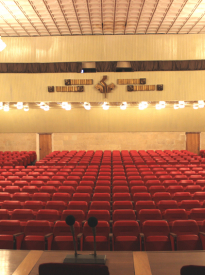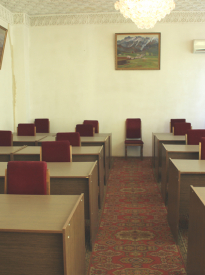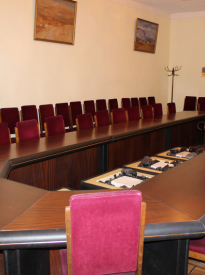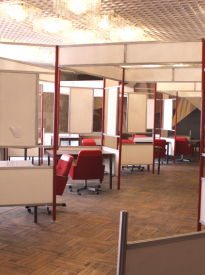WCIT 2019 Armenian team plans to hold its second massive technological conference in Moscow
The Armenian team of the World Congress on Information Technology (WCIT 2019) got an international recognition thanks to the high organizational work and is planning to hold its second massive technological conference in Moscow, the WCIT 2019 Yerevan organizational team said in a statement.
“WCIT 2019 Yerevan - a special moment for Armenia, an opportunity that focused the world's attention on the long and enduring tradition of innovation and achievement by Armenia and Armenians everywhere.
WCIT 2019 Yerevan was a genuinely consequential and memorable technology conference that made a statement with a scope of its intellectual ambition, the quality of its substance, and mastery of its execution. This became possible with a great team of professionals behind, a true spirit, and a conviction of the mission but most of all, with the enormous efforts and input of Alexander Yesayan, the Chairman of WCIT 2019 Yerevan organizing committee, president of the Union of Advanced Technology Enterprises of Armenia (UATE) and co-founder of UCom. As a result Armenia set a new standard for technology conferences worldwide.
The Armenian team of WCIT is now in the discussion stage with the city of Moscow to plan and execute its second massive technological conference. More updates will be available soon.
Armenia interested in cooperation with Belarus in high technology
Armenia is interested in cooperation with Belarus in high technology, Ambassador Extraordinary and Plenipotentiary Armen Ghevondyan told BelTA ahead of a meeting with representatives of the Belarusian business circles in the Belarusian Chamber of Commerce and Industry.
The Ambassador said in 2018 Armenia-Belarus trade totaled $50 million, 17% up over 2017, and in 2019 the trade came at $70 million. The growth did not result from a spike in one or another industry or field, Armen Ghevondyan noted. “We managed to move forward in this area thanks to concerted efforts of the two countries and entrepreneurial spirit of the business communities,” the Ambassador noted. “However, I am far from thinking that we have reached the point when we can say that this is our limit,” he added.
Armen Ghevondyan stressed that Belarus and Armenia do not use the full potential of cooperation. “We should also take into account that the economies of Armenia and Belarus are undergoing evolutionary changes. This is primarily due to close attention of the governments to such a trend as high technology. We could hardly imagine an economy of the 21st century without it. I am sure that in addition to traditional areas of cooperation, we will also greatly boost cooperation in IT, and our enterprises in this area will not only achieve their goals, but establish closer ties,” the Ambassador said.
He also believes that the two countries should promote interregional ties. “They should encompass even more fields of practical cooperation. This will broaden the scope of our cooperation and will have a positive impact on the indicators,” Armen Ghevondyan added.
Amberd Research Center is one of the best university think tanks in the world
On January 30, 2020, TTCSP 2019 Global Go To Think Tank Index Report of the University of Pennsylvania has been published, and according to which ASUE AMBERD research center ranked 94th in the World's Best University Think Tanks and 59th in Central Asia's Best Think Tanks.
Diana Galoyan, ASUE acting Rector, congratulated and thanked the staff of the research center for the efforts, noting that this success was a great achievement especially now, when efforts were made to improve the quality of education on the basis of science and research. "And in this context, we greatly value this remarkable achievement of our University Think Tank. It is a great honor to be included in this prestigious ranking report. I hope that we’ll also improve our reputation in the near future”; Head of the University stated.
The University of Pennsylvania is the only one to monitor and collect data on the activities of more than 8,000 Think Tanks all over the World, the best of which are ranked in the annual ranking after a certain methodology and multi-stage expert assessment.
It should be added that besides ASUE AMBERD research center, there are no other University Think Tank representing the South Caucasus countries in the "Best University Think Tanks" classification. The ranking of the best Think Tanks in Central Asia included 10 ones representing Armenia. According to the authors of the report, there are 30 Think Tanks in Armenia.
From digital society to smart cities: Japanese expert shares his experience in Armenia
Toshiyuki Zamma, Executive Advisor to Government Chief Information Officer of Japan, former head of the International Council of the Digital Government, sees good prospects for the cooperation with Armenia.
Recently Mr. Zamma visited Armenia to share his experience in the field of digital society, creation of smart city and IT.
“The purpose of my visit is to share my experience and get acquainted with the experience of your country. I am working in the Japanese government as an adviser to the government CIO, I am also the past chairman of the International Council of Digital Government. I have been in many countries and I am very happy to share my experience”, Toshiyuki Zamma told ARMENPRESS, assuring that the activity of a digital diplomat has no commercial, political purpose, it’s just an expert –to-expert help to create a better society with a digital power.
During his visit in Armenia Mr. Zamma delivered a lecture at the American University of Armenia (AUA), got many questions and gave comments. He said Armenia and Japan have the same problems and can solve them jointly. “For example, Japan shows too much respect to paper. Some companies created an automatic stamp robot. We are still in a paper business, in a paper era. Armenia is very similar to us”, he said, adding that the two countries have the same problems and can solve them.
Toshiyuki Zamma also met with the representatives of the Armenian government to talk not only about the digital economy, but also the digital society. “You need to use the digital power to make better rights for the citizens. Companies have to compete with the companies of other countries. The government has to create a better environment for the businesses”, he said.
According to him, the government should not be a service bender. Zamma recommends the government to be a platform especially in the digital sector. “If the government wants to create an application for instance for smartphones, that would not be useful. They should think about the regulations and rules. But the private company wants to be used more by clients. They continuously improve their services. There is quite difference between the private sector and the government”, he said, adding that the government should focus on creating a platform for the private sector, and the private sector should put the services on that.
Toshiyuki Zamma sees potential for IT development in Armenia. “Your people are very smart, are very good, have the manner. You have a huge potential to work with other countries internationally. I mean the human resource in Armenia has huge potential. Armenians speak English quite well, are strong in mathematics. Sometimes we can see the problem of the cultural background, the traditional way of the business and thinking, this is the barrier to move to the future. I heard that your government has changed, became very young, so you are lucky”, he said.
Toshiyuki Zamma says if one goes on without any preparations for the risks, it means failure. “But other countries also make the similar mistakes, have the same problems”, he said, adding that he can share this information.
“You should focus on the youth to make more familiar with the digitalization. The next step is to invite some international companies to collaborate with them and catch the good customer. If you make some product without customer, nothing good will happen. So you should find the good customer. This is the way to progress. 10 years ago Estonia had nothing, but now it has the top digital government because they focused on the human resources and the collaboration with the private sector”, Toshiyuki Zamma said.
As for the Armenia-Japan cooperation, Toshiyuki Zamma said they have many ideas, but the regulations are different. “Because of the regulations some ideas are difficult to do in Japan, however, if there is no problem to do this in Armenia, we can collaborate and test it here in Armenia, and the result will be good for the Armenian people. I think we should buy that solution from Armenia. Business cooperation will be, of course, possible”, he said.
Mr. Zamma also introduced their successful experience in the creation of a smart city. He said the real smart city is the use of technologies for improving the people’s life quality. “In this context we should find what is the biggest problem in your city in order to solve that. Next time we should solve the second problem by using the digital technologies. Sometimes there is a mistake according to which the smart city is when just good network, good applications are provided”, he said.
“There are many applications now in Japan about the disaster, about the earthquake for example. Another application is a map of crimes, and information about it is provided by the Police”, he said.
As for the regulation of the public transportation issue Mr. Zamma said Japan uses sensors on the buses and the trains. So the people can understand where is their bus, when it will arrive and how long they have to wait for the next. “Sometimes buses are coming at the same times, so we can choose which one is better”, he said, adding that now bicycles are also quite widespread in Japan.
Toshiyuki Zamma said he is ready to again give lectures in Armenia in case of a next opportunity and share his experience. He says he is focused on educating the people, organizing trainings.
Welcome To The World’s Next Tech Hub: Armenia
Supporters of Armenia's popular opposition leader attend a rally in downtown Yerevan on April 26.
As Azerbaijan, Georgia, and Turkey join together and engage in major infrastructure projects, such as the Baku-Tbilisi-Kars railway, to revive their historic role as a land bridge between east and west, Armenia has been conspicuously left by the wayside. However, Armenia has taken a different path. Rather than diving head first into the promises of the New Silk Road or industrialization, they’re wagering their chips on a completely different table: technology.
Armenia is a landlocked country in the bowels of the Caucasus with scant natural resources. It doesn’t have any ports. It isn’t on the road to anywhere. You can’t even enter or exit Armenia from the east or west, where hostile relations with both Azerbaijan and Turkey have resulted in long closed borders. All the country has is human capital, which it’s doubling-down on as high-tech research and development has become a national priority—a do or die objective to connect and do business with the outside world and break the blockade that’s building up around it.
While Armenia has been making strides towards developing its high-tech sector for many years, it wasn’t until the Armenian Revolution of 2018 that momentum really started to build. Suddenly, the little, insignificant country hidden deep in the centerfold of the world map was full of hope and looking forward to a future that seemed unusually bright.
“The Armenian nation has never really been able to live for itself. It's always had someone dominating it or ruling it or manipulating it,” explained the half-Armenian Reddit cofounder, Alexis Ohanian, as we sat together in Yerevan. “This could mark the start of the first time when this country and especially the young people—the ones who are the most hungry, the most driven, the most optimistic—to actually have a chance to determine for themselves the fate of the country and where it heads, and that is a part of the Armenian experiment that has not really ever happened.”
A new outlook was established, and the power of technology was one of its driving forces: IT, software development and high-tech startups would form the backbone of the newly reemergent nation.
“We have small resources and high technology is one of the main directions of the Armenian economy to overcome the blockade and to import and export our educational brands outside,” said Arayik Harutyunyan, Armenia’s Minister of Education and Science.
Tech is now the largest foreign investment in Armenia and many of the world’s most powerful technology firms—including Intel, Microsoft, Google, IBM, Synopsys and Cisco—all have a physical presence there, as the country’s tech sector grew 33% in 2018 to become a $250 million a year industry. While these numbers don’t seem like much—it’s scarcely more than what Jeff Bezos makes in one day—we need to keep Armenia’s diminutive size and small population in perspective.
Startups
Influenced by Armenian diaspora companies like Service Titan, which is now valued at about $1 billion, and native Armenian firms such as Shadowmatic, which won the Apple Design Award in 2015, Armenia’s startup scene has been growing rapidly.
Narek Vardanyan, founder of The Crowdfunding Formula
WADE SHEPARD
Narek Vardanyan started The Crowdfunding Formula, one of the world’s top crowdfunding marketing firms, almost by accident. He was so unsuccessful at a Kickstarter campaign for a previous startup that he went back to the drawing board and started learning about crowdfunding from the ground up. He began calling up companies and individuals who had directed successful crowdfunding campaigns before and asked them how they they did it. He took notes and compiled them in a book called The 57 Secrets of Crowdfunding, which he self-published and lackadaisically put up for sale on Amazon. To his surprise, the book quickly rose to became the #1 bestseller in the crowdfunding category.
Although he never actually ran a successful campaign himself, Narek Vardanyan was suddenly regarded as a crowdfunding authority. Local startups began coming to him for assistance, and he began putting his know-how to work—and soon realized that the information he put in his book actually worked.
So in 2015, Narek Vardanyan started The Crowdfunding Formula to manage and market the Kickstarter and IndieGogo campaigns for startups from all over the world, and the success stories began piling up: $4 million for Bionic Gym, $3 million for Volterman smart wallets, $1.7 million for a Monkii fitness device, etc. Their last nine campaigns raised over $17 million.
“We have to show that Armenia isn't only a developing country, but that we've had some early successes here,” Narek Vardanyan said.
Another early success in Armenia’s startup scene was PicsArt, which is today one of the world's top photo editing apps. Mikayel Vardanyan (no relation to Narek), the cofounder and CPO, said they came up with the idea when fellow cofounder and future CEO Hovhannes Avoyan's daughter grew frustrated with a photo editing program that she was trying to use. That was in 2010, a time when the Google Play store was a pretty barren place.
“So we were like, ‘let's create something that will help non-creative or non-experienced people to be creative,’” he said.
He worked with a small team of 10 people, mostly students, and came up with the first iteration of the PicsArt app. It was something that other Android users were clearly looking for—a lot of other users, in fact. In its first month the PicsArt app was downloaded over a million times. By 2020, this number is up to 600 million, as the app now has upwards of 150 million regular monthly users.
Mikayel Vardanyan, cofounder of PicsArt
WADE SHEPARD
PicsArt went on to receive numerous awards and accolades, including ranking fifth in the Forbes Top 50 Startups of 2015, as Mikayel’s small team of ten grew into a 500 person global operation with offices in Armenia, San Francisco, Beijing, Moscow, Tokyo and LA.
“If you look ten years ago, there were very few companies [in Armenia.] So at that time doing a startup was not a part of the culture, it was pretty new and most of the people were afraid to do it or didn't know how to do it, so they just preferred to work at a more safe place [rather than] doing a startup where everything is unpredictable,” PicsArt’s Vardanyan said.
But this has all changed today, as startups have grown to become one of the biggest trends in Armenia. Mikayel predicts that there are now over 500 startups in the country, with many of them finding success and expanding outside of Armenia.
“We were a really good example for others that you can do this from Armenia; it doesn't matter where you are,” he said.
There have been other good examples as well, including Zoomerang, a video editing app which is rivaling Tik Tok with its 100,000 daily downloads and 10 million users, and ggTaxi, which takes the place of Uber in Armenia and is available in Georgia and Russia.
While the Armenian government doesn’t offer much in the way of direct funding for startups they do provide preferential tax breaks specifically designed for IT companies and tech startups. Basically, they don’t pay any income taxes and only face a payroll tax of 10%, along with other perks and incentives. The new government is also making it easy to start a business in Armenia, offering an “open door” policy which is designed to attract foreign businesses and investors. According to the World Bank’s Doing Business report, Armenia is the 10th easiest country in the world to start a business in.
Education
I asked the Education Minister Kzhdryan what sets Armenia apart from the rest of the emerging markets in the world that are also currently trying to use tech to leapfrog their rivals and boost their economies.
“Our brains,” he replied instantly. “We can create a lot of resources by using our brain.”
Part of Armenia’s rapid success in the global tech world was due to the country’s legacy as an education center.
“Since the time of the Soviet Union, Armenia had the best schools,” Mikayel repeated the oft-stated fact.
Armenia was the Soviet Union’s scientific hub and center of its research activities, providing nearly half of the high-tech needs of the Soviet military. This legacy is still alive today in how the society embraces and values education and hard science.
Karen Vardanyan, founder of Armath.
WADE SHEPARD
One man that has made improving the technological studies of Armenia’s students his life’s mission is Karen Vardanyan. In 2014, he started a program calledArmath, which sought to put robotics laboratories in rural schools across Armenia.
“When students start university programs we noticed that they come from schools that are not so strong in what's called STEM (Science, Technology, Engineer, Math),” he said. “So we started to find some equipment to provide to schools to start robotics laboratories.”
The free program spread rapidly, and there are now 575 Armath labs throughout Armenia and Georgia which have over 15,000 students—84% of which are admitted to universities.
This is a growing movement across Armenia, where, as of the end of last year, there were robotics labs in 25% of the country’s schools—something which the government is hoping to up to 50% in the coming year.
“The fact that Armenian culture is so hungry for hard science and hard math means that there can be an ecosystem of talented AI developers who will thrive here, because that is a skillset that's only going to increase in value,” Ohanian concluded.





